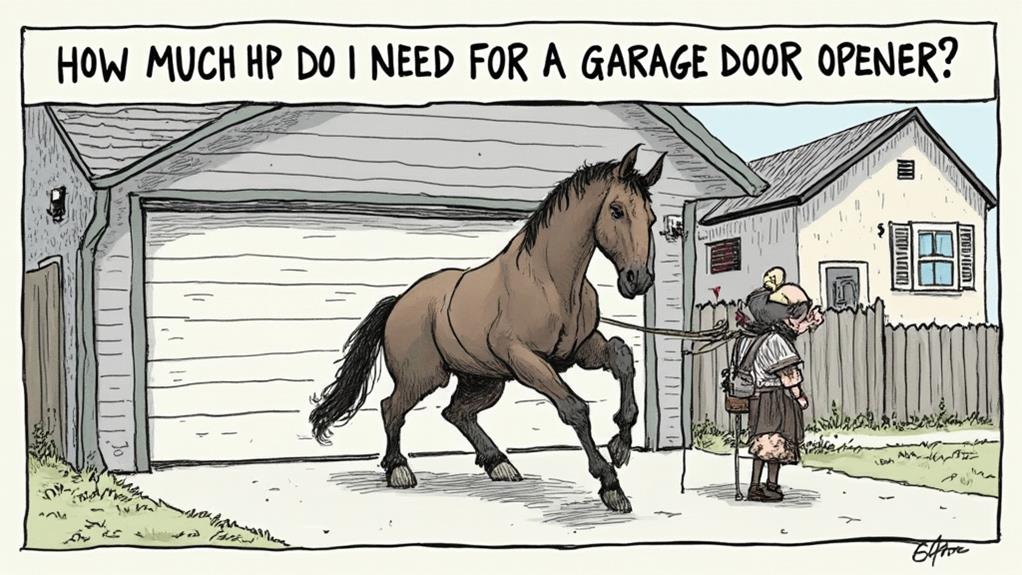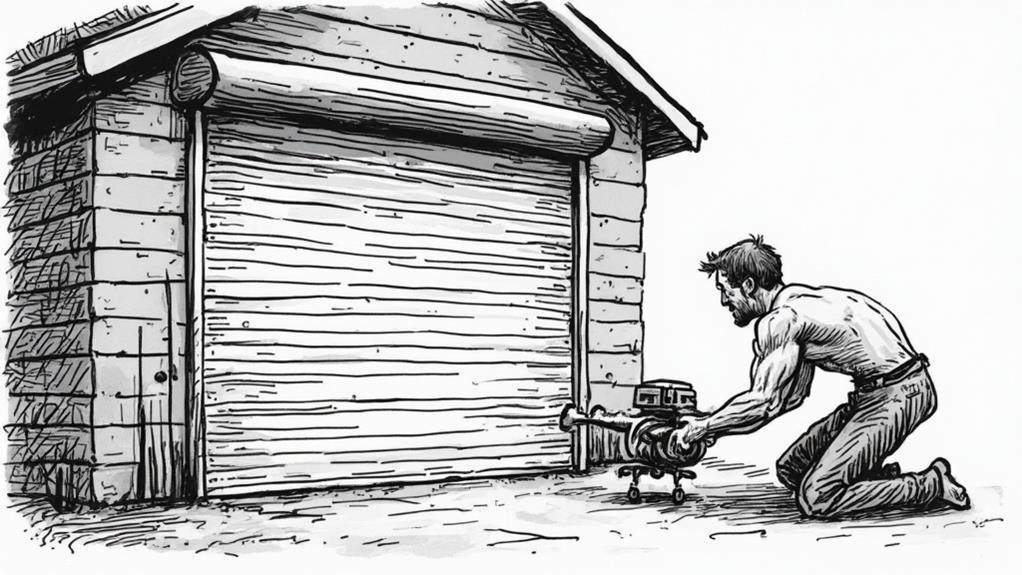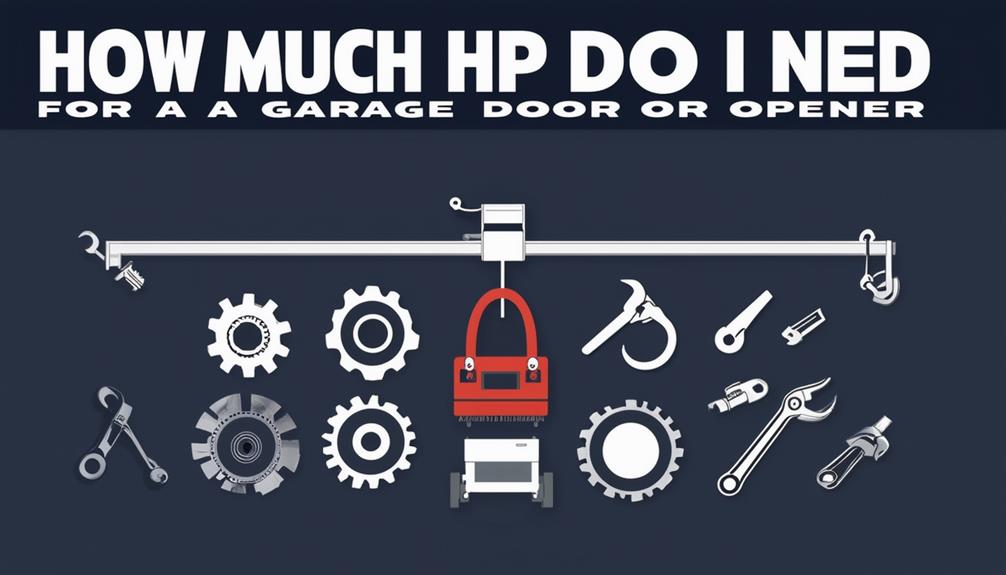
How Much HP Do I Need for a Garage Door Opener?
The horsepower (HP) you need for your garage door opener depends primarily on your door's weight, size, and usage frequency. For most residential single-car garage doors with lightweight materials, a 1/2 HP model is suitable. Heavier doors, like solid wood or insulated steel, may require 3/4 HP openers. The heaviest doors or commercial applications often need 1 HP models. Consider factors such as door height, daily usage, and climate conditions when selecting an opener. Modern garage door openers offer improved safety features, enhanced convenience, and energy efficiency. To guarantee the best performance and durability, it's vital to choose an opener with adequate power for your specific needs.
Horsepower Rating for Openers

When selecting a garage door opener, you'll need to ponder its horsepower (HP) rating, which typically ranges from 1/3 HP to 1 1/2 HP for residential use. Comprehending these ratings is paramount, as they directly correlate to the opener's lifting capacity and overall performance.
Factors such as your garage door's weight, material, and size will influence the HP rating you need, so it's critical to evaluate these elements before reaching your final conclusion.
Understanding HP Ratings
Horsepower ratings for garage door openers can be confusing, but they're essential in determining the right opener for your needs. In the garage door industry, you'll encounter fractional HP ratings like 1/3, 1/2, and 3/4. These numbers represent the motor's power output, with higher values indicating greater lifting capacity. However, it's pivotal to understand that these ratings aren't always directly comparable between manufacturers.
When evaluating HP ratings, consider factors such as door weight, size, and frequency of use. For instance, a 1/3 HP opener might suffice for a standard single-car garage door, while a 1/2 HP model could be more suitable for heavier double doors. Are you dealing with an oversized or custom door? In that case, you might need to opt for a 3/4 HP or even a 1 HP unit. Remember, choosing an opener with insufficient power can lead to premature wear and reduced lifespan. Conversely, an overpowered unit may unnecessarily increase energy consumption. To make an informed decision, consult the manufacturer's specifications and consider seeking advice from a professional installer who can analyze your specific garage door setup.
Common HP Ranges
Now that you understand the importance of HP ratings, let's explore the common ranges available in the market. Garage door openers typically come in three standard horsepower ratings: 1/2 HP, 3/4 HP, and 1 HP. The 1/2 HP models are suitable for most residential single-car garage doors, particularly those made of lightweight materials like aluminum or hollow steel.
If you have a heavier door, such as one made of solid wood or insulated steel, you'll want to ponder a 3/4 HP opener. These units provide additional lifting power and are ideal for two-car garage doors or single doors with added weight.
For the heaviest doors or commercial applications, 1 HP openers offer the most robust performance. They're also an excellent choice if you frequently use your garage or have a door with custom features that add extra weight.
When selecting your opener, evaluate factors like door size, material, and frequency of use. Have you measured your door's dimensions and weight? This information will help you determine the appropriate HP rating for your specific needs.
Factors Affecting HP Needs
Several factors influence the horsepower rating you'll need for your garage door opener. The size and weight of your garage door are primary considerations. Heavier doors, particularly those made of solid wood or insulated steel, require more powerful openers.
The door's height also plays a role; taller doors necessitate increased lift capacity. Have you considered your door's frequency of use? If you're opening and closing it multiple times daily, you'll want a higher HP rating for durability.
The door's construction type affects HP needs as well. Single-piece doors often require more power than sectional ones. Climate conditions in your area shouldn't be overlooked; extreme temperatures can impact the opener's performance.
Does your garage have high ceilings? Longer tracks may demand more horsepower. Additionally, consider any accessories you plan to add, such as battery backups or smart home features. These can increase the load on the motor.
Ultimately, think about future needs. If you're planning to upgrade to a heavier door or increase usage, opting for a higher HP now could save you from replacing the opener later. Always consult with a professional to identify the appropriate horsepower for your specific situation.
Benefits

When selecting a garage door opener, you'll find several benefits that can enhance your home's functionality and security. Modern openers offer improved safety features, such as auto-reverse mechanisms and rolling code technology, which greatly/considerably/substantially reduce the risk of accidents and unauthorized access.
Additionally, you'll enjoy enhanced convenience through smartphone integration, quiet belt-drive systems for peaceful operation, and energy-efficient models that can help lower your electricity costs.
Improved Safety Features
Modern garage door openers come equipped with a host of improved safety features that provide vital benefits to homeowners. You'll find that these advancements have greatly reduced the risk of accidents and injuries associated with garage door operation.
One of the most essential safety features is the auto-reverse mechanism. This system uses sensors to detect objects in the door's path, automatically reversing the door's direction if an obstruction is encountered. Additionally, many openers now incorporate rolling code technology, which changes the access code each time you use your remote. This feature prevents potential intruders from intercepting and duplicating your opener's signal.
You'll also appreciate the inclusion of manual release handles, allowing you to disengage the opener during power outages. Some models offer battery backup systems, ensuring continuous operation even when the electricity is out. Have you considered the benefits of smart garage door openers? These systems allow you to monitor and control your garage door remotely, providing peace of mind and enhanced security. With features like automatic closing timers and smartphone notifications, you'll never have to worry about accidentally leaving your garage door open again.
Enhanced Convenience
Beyond safety features, garage door openers offer a range of conveniences that can substantially improve your daily life. Modern openers come equipped with remote controls, allowing you to operate your garage door from the comfort of your vehicle. You'll no longer need to brave inclement weather or fumble with keys in the dark.
Many models now integrate with smart home systems, enabling you to control your garage door via smartphone apps or voice commands. Have you ever worried about leaving your garage door open? Smart openers can send alerts to your phone and even close the door remotely.
For households with multiple vehicles, multi-button remotes or personalized access codes provide tailored entry options for each family member. Some openers feature built-in LED lighting, illuminating your garage as you enter or exit. Battery backup systems guarantee you can still operate your door during power outages.
For those who frequently receive deliveries, certain models offer secure package delivery options, allowing couriers to place parcels inside your garage. With these enhanced conveniences, you'll wonder how you ever managed without a modern garage door opener.
Quiet Operation
The serene operation of a garage door opener can markedly enhance your home's comfort and tranquility. When selecting a garage door opener, consider models designed for quiet operation. These units typically employ DC motors, which are remarkably quieter than their AC counterparts. Additionally, look for openers with belt drives or screw drives, as they produce less noise compared to chain-driven systems.
You'll want to pay attention to the horsepower rating, as higher HP motors often run more smoothly and quietly. However, it's critical to balance power with noise reduction features. Many manufacturers offer vibration isolation systems and sound-dampening materials that further minimize operational noise. Have you considered the benefits of soft start and stop technology? This feature gradually increases and decreases motor speed, reducing the jarring sounds associated with sudden movements.
When installing your quiet garage door opener, make certain all components are properly lubricated and the track is aligned correctly. Regular maintenance, including tightening bolts and lubricating moving parts, will help maintain quiet operation over time. By prioritizing noise reduction in your garage door opener selection, you'll create a more peaceful home environment and minimize disturbances to both your household and neighbors.
Energy Efficiency Advantages
While quiet operation enhances comfort, energy efficiency can substantially impact your wallet and the environment. When selecting a garage door opener, consider models that incorporate energy-saving features. Many modern openers utilize LED lighting, which consumes considerably less power than traditional incandescent bulbs. Have you thought about openers with standby power modes? These units automatically reduce energy consumption when not in use, potentially saving you money on utility bills over time.
Look for openers with DC motors, as they're typically more energy-efficient than their AC counterparts. These motors often provide smoother operation and use less electricity during startup and operation. Some manufacturers offer solar-compatible openers, allowing you to harness renewable energy to power your garage door system. Doesn't that align with eco-friendly home improvements?
When shopping, pay attention to the opener's horsepower rating. While higher HP units may seem more powerful, they're not always necessary and can consume more energy. Choose an opener with appropriate power for your door's weight and usage frequency. Remember, energy efficiency isn't just about immediate savings; it's an investment in long-term cost reduction and environmental stewardship. How will you prioritize energy efficiency in your garage door opener selection?
Safety Features and Sensors

When selecting a garage door opener, safety features should be a top priority. You'll want to look for models equipped with obstacle detection systems, auto-reverse functionality, and entrapment protection mechanisms. These critical safety components work together to prevent accidents and guarantee the well-being of your family, pets, and property.
| Safety Feature | Function | Importance |
|---|---|---|
| Obstacle Detection | Senses objects in door's path | Prevents collisions |
| Auto-Reverse | Reverses door if obstruction detected | Minimizes damage |
| Entrapment Protection | Stops door if unusual resistance sensed | Prevents injuries |
| Photo Eye Sensors | Detects movement across door's threshold | Enhances safety |
Obstacle Detection Systems
Since the 1990s, garage door openers have been required to include safety features that prevent accidents and injuries. One of the most essential components of these safety systems is the obstacle detection system, which uses sensors to detect obstructions in the door's path. You'll find two primary types of obstacle detection systems: photoelectric eyes and pressure-sensitive safety edges.
Photoelectric eyes, also known as photo eyes, consist of two sensors mounted on either side of the garage door opening. These sensors emit an invisible beam across the doorway, and if an object breaks this beam while the door is closing, the opener immediately reverses the door's direction. Typically, they're placed about 6 inches above the ground to detect both small objects and people.
Safety edges, on the other hand, are pressure-sensitive strips attached to the bottom of the garage door. When the door contacts an obstacle during its descent, the pressure on the strip triggers the opener to reverse. Some advanced models even incorporate both systems for enhanced safety. Have you considered which type of obstacle detection system would work best for your garage? It's critical to guarantee that whichever system you choose is properly installed and regularly tested to maintain ideal safety.
Auto-Reverse Functionality
Ensuring your safety is the primary function of a garage door opener's auto-reverse feature. This indispensable mechanism is designed to prevent accidents and injuries by detecting obstructions in the door's path. When an object or person interrupts the door's downward motion, the auto-reverse functionality immediately stops the door and reverses its direction, preventing potential harm.
Modern garage door openers typically employ two types of auto-reverse systems: mechanical and photoelectric. The mechanical system relies on pressure sensitivity, activating when the door encounters resistance. Photoelectric sensors, often called "safety eyes," use infrared beams across the door's opening to detect objects. If the beam is broken, the door will automatically reverse.
How can you guarantee your auto-reverse feature is working correctly? Test it regularly by placing a solid object, like a 2×4 board, in the door's path. The door should reverse upon contact. For photoelectric sensors, wave an object through the beam while the door is closing. If functioning properly, the door will immediately reverse. Don't you think it's worth taking a few minutes to check this essential safety feature? Remember, maintaining your auto-reverse system is necessary for protecting your family, pets, and property.
Entrapment Protection Mechanisms
Auto-reverse functionality is just one part of a thorough safety system in modern garage door openers. To guarantee maximum protection, you'll want to think about the full range of entrapment protection mechanisms available. These safety features work in tandem to prevent accidents and injuries.
One pivotal component is the photoelectric sensor system. You'll typically find these sensors mounted near the floor on both sides of the garage door opening. They create an invisible beam that, when broken, immediately halts and reverses the door's movement. This prevents the door from closing on objects, pets, or people in its path.
Another important safety feature is the pressure-sensitive bottom edge. When the door encounters an obstacle during closing, this mechanism detects the resistance and triggers the auto-reverse function. Some advanced models even incorporate infrared scanners that can detect motion in the door's path.
Have you deliberated a door monitor? This device allows you to check your garage door's status remotely, ensuring it's not left open accidentally. When choosing a garage door opener, prioritize models that offer an all-inclusive suite of these safety features to protect your family and property.
Frequently Asked Questions
Can I Install a Garage Door Opener Myself?
You can install a garage door opener yourself if you're handy and comfortable with DIY projects. It's a challenging task that requires basic electrical knowledge, proper tools, and safety precautions. Consider your skills before attempting this installation.
How Long Does a Typical Garage Door Opener Last?
You can expect your garage door opener to last 10-15 years with proper maintenance. However, you'll find that factors like usage frequency, climate, and quality of installation can impact its lifespan. Regular servicing will help extend its durability.
Are Garage Door Openers Compatible With Smart Home Systems?
Yes, many modern garage door openers are compatible with smart home systems. You can integrate them with voice assistants, control them remotely via smartphone apps, and even set up automated routines. They're becoming increasingly popular for their convenience and security features.
What's the Difference Between Chain-Drive and Belt-Drive Garage Door Openers?
You'll find chain-drive openers are noisier but more affordable and durable. Belt-drive openers operate more quietly and smoothly, but they're pricier. Your choice depends on your budget and noise tolerance. Consider your garage's location when deciding.
How Noisy Are Garage Door Openers During Operation?
You'll find that garage door opener noise varies. Chain-drive models tend to be louder, while belt-drive options offer quieter operation. Direct-drive systems are often the quietest. Regular maintenance can help reduce noise levels for all types.





